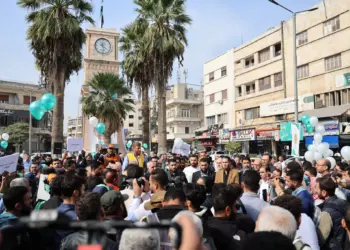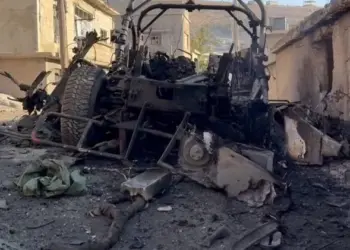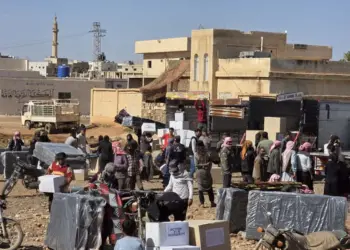Last week marked six months since the fall of Bashar al-Assad and the beginning of the fragile, fast-moving political transition that followed. In the lead-up to this milestone, ETANA conducted a nationwide public opinion survey to assess how Syrians view interim authorities as well as Syria’s evolving political landscape. The findings offer a complex and often polarised picture: while many Syrians report feeling safe and hopeful about the country’s new trajectory, concerns persist around economic hardship, transparency and rights protection—particularly for women and members of religious and ethnic minority groups. Approval of interim President Ahmad al-Shara’a is relatively high, yet satisfaction drops when it comes to institutional processes such as the Constitutional Declaration and National Dialogue Conference. The survey findings underscore various regional, sectarian, gendered and educational divides in public trust, highlighting the challenge of building inclusivity during this period. Responses tell us that as the interim authorities navigate the next stage of the post-Assad transition, they must prioritise inclusion, transparency and policies that serve the Syrian people. The opportunity to build a broader social contract exists, but it requires acknowledging and addressing the scepticism and exclusion that many still feel.
Key findings
Conducted six months into Syria’s fragile and fast-moving political transition, this survey provides a critical snapshot of public sentiment. While there is notable support for interim President Ahmad al-Shara’a (71% of respondents were satisfied with the steps al-Shara’a has taken so far in managing the transition) and a general sense of optimism among key constituencies (with satisfaction highest among Sunni, male and less educated individuals, particularly in provinces like Idlib, Daraa and Quneitra), this support is uneven and deeply segmented.
Syrians from religious and ethnic minority communities, women and more educated groups expressed lower levels of trust, inclusion and satisfaction with both the process and substance of the transition. As many as 70% of respondents from religious minority communities felt unsafe, and 76% were dissatisfied with their current level of freedom in Syria. A significant majority of respondents from minority communities—84%—believe women’s rights are not protected or supported by the new authorities. In addition, 78% of respondents from these communities also reported feeling dissatisfaction with authorities’ transparency in decision-making.
There is a broad disconnect between the Sunni majority population and minority communities when it comes to Syria’s transition and political trajectory. While 73% of respondents were optimistic about the country’s direction, 77% of respondents from minority communities said interim authorities do not represent their interests. Similarly, al-Shara’a received broad personal approval from Sunni respondents, but support for political steps within the transition remains limited with only 43% of respondents satisfied with the Constitutional Declaration and 40% of respondents satisfied with the outcomes of the National Dialogue Conference.
The survey also coincided with a major political development: on 13th May, midway through data collection, US President Donald Trump announced the lifting of all US sanctions on Syria. This move had a measurable impact on survey responses, with post-announcement responses on Syria’s trajectory trending six to 14 percentage points more positively. This suggests the sanctions decision may have served as a symbolic boost in terms of both perceived legitimacy and national outlook.
The positive shift in responses following the US sanctions decision underlines how quickly public perceptions can change in response to symbolic or international signals. However, sustained legitimacy will depend less on external developments and more on the implementation of decent policymaking that expands representation, protects rights and addresses economic grievances.
Methodology
ETANA conducted a nationwide public opinion survey between 12th and 17th May 2025, reaching 1,400 people across all of Syria’s 14 governorates. Of the respondents, 52% were female and 48% male, with 100 respondents from each of Syria’s 14 governorates. While the survey sample was designed to capture Syria’s pluralism, it is not demographically representative, and results are being treated as indicative.
Survey results
Results show that while most respondents reported feeling safe, men (74%) felt safer than women (63%). Safety perceptions were significantly higher among Sunni respondents (approximately 85%) and markedly lower among Druze (18%), Alawis (21%) and other ethnic and minority groups. Regional disparities are similarly sharp, with higher feelings of safety reported in Daraa, Homs, Idlib and Raqqa as compared to the lower perceptions of safety observed in Suwayda and Tartous. Additionally, those working in media or services and hospitality reported the lowest perceptions of safety across working sectors.
As with feelings of safety, men (66%) reported feeling more satisfied than women (57%) with the level of freedom they are currently experiencing in Syria. Sunni respondents were most satisfied (78%), compared to just 22% of Christians and 18% of Alawi respondents, with their current levels of freedom. Results also showed that satisfaction with freedom dropped as respondents’ level of education increased: 66% of respondents with no education reported satisfaction, as compared to less than 50% with postgraduate degrees. Finally, it is notable that optimism around freedom markedly increased by 12% in responses collected after President Trump’s announcement about lifting sanctions on Syria.
Optimism about the country’s direction was highest among Sunni (81%), male (74%) and less educated respondents, particularly those in Daraa (83%), Idlib (87%) and Raqqa (80%) provinces. By contrast, women (62%), religious minority communities such as Druze (27%) and Alawis (29%), and postgraduates (below 50%) expressed significantly lower levels of optimism. This divergence suggests emerging political fault lines within Syria’s post-Assad transition, where hope is concentrated among core support groups while others remain sceptical, excluded or uncertain about the direction of change. Again, optimism rose in responses collected after US President Donald Trump announced the lifting of sanctions.
Satisfaction with interim President Ahmad al-Shara’a’s management of the transition is relatively high—especially among younger, less educated Sunni men from Aleppo, Daraa, Deir Ezzor, Idlib and Raqqa. Religious and ethnic minority groups, including Druze, Alawis, Yazidis, Christians and Shia, expressed significantly lower levels of satisfaction across governance indicators. Dissatisfaction with the steps al-Shara’a has taken during the transition was highest among Yazidis (79% dissatisfied), followed by Druze (71% dissatisfied). Only 31% of non-religious respondents and 32% of Alawis expressed satisfaction.
Most respondents (62%) felt that interim authorities represent their interests, with support strongest among Sunni men in Daraa, Idlib and Raqqa. Perceptions of representation dropped significantly among respondents from religious minority communities (23%), women (42%) and university-educated respondents. Christian respondents were somewhat more positive than other religious and ethnic minority groups, with 44% saying they felt represented, potentially due to less exposure to post-transition violence. Responses collected after the US administration’s 13th May sanctions announcement were 13 percentage points more positive on the issue of representation.
A similar pattern emerged when respondents were asked about transparency. While 59% overall are satisfied with the level of transparency shown by interim authorities in decision-making, this dropped to 55% among female respondents. The same trend inverted when applied to sectarian identity: 78% of non-Sunni respondents reported dissatisfaction with transparency. Satisfaction also declined with education, with only 39% of those with a graduate-level education expressing satisfaction.
Only 43% of respondents were satisfied with the Constitutional Declaration, however a large portion—30%—answered “I don’t know” to the question, perhaps indicating either a lack of awareness or understanding. This raises questions about communication and outreach on institutional reforms. The most scepticism was shown by respondents from religious minority communities, only 10% of whom were satisfied with the contents of the Constitutional Declaration. The lowest approval levels were recorded among Yazidis, Alawis, Druze as well as those who identified as non-religious.
By employment group, it was those working in media or the legal profession who were most sceptical. Satisfaction decreased as education level increased, with only 40% of those with graduate degrees reporting feeling satisfied with the content of the Constitutional Declaration. Women were less satisfied (38%) with the Constitutional Declaration than men (49%), reflecting a deeper mistrust of political institutions or perceived exclusion from formal processes. The geographical areas least satisfied were the provinces of Hasakeh, Suwayda and Tartous.
Only 40% of those surveyed were satisfied with the outcomes of the National Dialogue Conference. Again, a large portion—this time, 32%—answered “I don’t know” to this question, possibly pointing to unclear messaging or limited participation. In line with results to previous questions, professional groupings were notably less satisfied with the outcomes of the conference: 65% of those working in the legal profession and 60% of those working in media reported dissatisfaction with the outcomes of the National Dialogue Conference. And again, satisfaction decreased as education levels increased. The lowest support for the National Dialogue Conference came from religious and ethnic minority communities. Geographically, scepticism is highest in Hasakeh and Tartous.
54% of women said that women’s rights are protected, compared to 64% of men. Perception gaps on rights protections are stark by region: for example, 93% in Daraa and Idlib believe rights are upheld versus just 15% in Suwayda. The overwhelming majority of respondents from religious minority communities believe the interim authorities do not protect or support women’s rights. This includes 89% of Druze and Yazidi respondents; 88% Alawi, 83% Ismaili and 73% Christian respondents responded “no.”
Economic outlook
Concerns persist around economic hardship: most respondents stated their personal economic situation has either deteriorated or remained unchanged since interim authorities took power. Satisfaction with both the interim authorities’ handling of the national economy and respondents’ personal economic situations rose significantly following Trump’s announcement on lifting sanctions on Syria. Reports of personal economic improvement were more common in Idlib and Quneitra, while worsening conditions were noted in Suwayda and Rural Damascus. Dissatisfaction remained particularly pronounced among respondents from minority backgrounds, with 78% of Druze stating they were dissatisfied. By sector, those working in manufacturing and media reported the lowest levels of satisfaction with the current economic outlook in Syria.
Overall, these results reveal a fragmented public mood, where hope and approval sit alongside deep scepticism and uneven experiences of the post-Assad transition. Support was concentrated among Sunni, male, younger and less educated populations. In contrast, minority groups, women, older citizens and those with higher levels of education expressed more doubt about transparency, inclusiveness and rights protections. Contradictions emerged across several indicators: respondents showed high satisfaction with interim President al-Shara’a’s leadership, yet much lower approval of the Constitutional Declaration. These patterns suggest that responses were often shaped more by emotion or symbolic cues than by confidence in institutional reforms.
The approval of interim President al-Shara’a and broader optimism may reflect anti-Assad sentiment or symbolic developments such as the lifting of US sanctions, rather than deep or sustained endorsement of the interim authorities. These divides highlight emerging political fault lines that could threaten the legitimacy and cohesion of Syria’s transition. While the findings point to some public support for the new authorities, they also underscore the urgent need to engage excluded communities and deliver on promises of inclusive governance.
Assessment
Six months into Syria’s fragile and fast-moving political transition, ETANA’s latest survey provides a critical snapshot of public sentiment. While there is notable support for interim President Ahmad al-Shara’a and a general sense of optimism among key constituencies, this support is uneven and deeply segmented. Syrians from religious and ethnic minority communities, women and more educated groups expressed lower levels of trust, inclusion and satisfaction with both the process and substance of the transition.
The positive shift in responses following the US sanctions announcement underlines how quickly public perceptions can change in response to symbolic or international signals. However, sustained legitimacy will depend less on external developments and more on the implementation of decent policies that expand representation, protect rights and address economic grievances.
As interim authorities navigate the next stage of the transition, they must prioritise inclusion, transparency and policies that serve all of the Syrian people. The opportunity to build a broader social contract exists, but it requires acknowledging and addressing the scepticism and exclusion many still feel.





